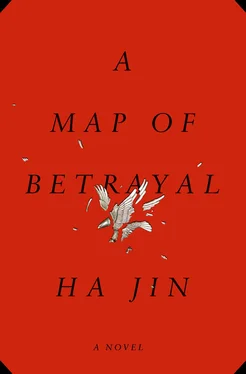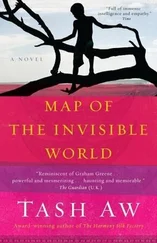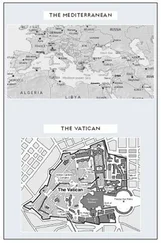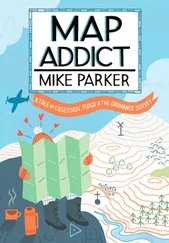Around midmorning the next day, I went to Ben’s company, which was on the top floor of a small concrete building on Washington Street, near the public library. He had three employees, two women and one man. The man, screwdriver in hand and wearing an earring and a pink button-down, was at a desk working on a computer, its innards fully exposed. One of the female employees was a young Ukrainian named Sonya, whom Ben introduced to me as his girlfriend. She was slightly thick-boned but looked smart and energetic with straw-colored hair and hazel eyes. When we were alone again, I asked Ben what kind of women he was fond of. He seemed abashed. “Gosh,” he said, “you think I treat women as a commodity? That’s a capitalist mentality.” He gave a half laugh. “Sonya is somebody I can trust. When I travel abroad on business, I need a person to cover my bases.”
“It’s not easy to find someone trustworthy,” I admitted.
Sonya joined us for lunch at a noodle joint. I found that she used chopsticks more skillfully than I did; what’s more, she could use them with both hands. She said she was ambidextrous and could also write either way. I’d never met such a person before. Sonya grew more vivacious as we were conversing. She confessed she’d been “seduced” by Ben because he was a gourmet and used to take her to all the cheap but good restaurants. Ben protested, “Please, don’t be so forgetful. I’ve never been stingy to you. Didn’t our company help you apply for a green card?”
“I’ve been working my butt off for that,” she replied.
Sonya told me that her parents and two younger sisters were all back in Donetsk. She’d gone to Brandeis University on an international scholarship, and after college she decided to stay for a few years in the States. At this point she wasn’t sure how long she would live here, though she had applied for permanent residency. There was a possibility she’d go to Europe, to either the Netherlands or Denmark, where she had relatives, to see if she might like it there. She spoke about emigrating as if it were as simple as changing jobs. I was impressed. Her life must have been full of adventures.
After lunch Sonya returned to work while Ben drove me to a yacht club behind a mid-rise tenement whose flattish, undersize windows brought to mind a jailhouse. He said he was going to give me a boat tour. He unlocked the gate to a private dock and strolled along the pier, taking me to the waterside. When we had reached the end of the dock, he leapt onto a motorboat, shouting, “Let’s have a ride!”
I followed him and jumped aboard. He took a Nikon camera out of his shoulder bag and strapped it around his neck. The boat rocked a little while a rush of delight ran through me. Ben started the engine, and we sped out toward the greenish ocean. The wind was rushing by, tousling our hair. I felt a sophomoric thrill and began letting out happy cries. Ben handed me a pair of mirror sunglasses, and I put them on. The subdued light at once rendered all objects closer.
We stopped near a lighthouse, of which Ben shot a few photos. He also snapped pictures of seabirds and a passing ferryboat. He gave a few lusty shouts and waved at the passengers aboard. From a distance people might have taken us for a couple — with the shades on I would appear younger, my figure accentuated by the fluttering dress that hugged my body. Then we proceeded toward a shipyard, where some ships were docked for repairs. I thought we were taking a shortcut back to the pier, but a long destroyer emerged, nobody visible on its deck. Ben stopped our boat, its engine idling. He went to his knees to steady the camera and began snapping photos of the warship, its satellite dishes, front cannon, missile launchers. I stood stupefied, and he veered and took a picture of me. I must have looked silly in that one, my mouth perhaps agape. Before I could say anything, he revved the engine and we raced away, going back by the route we had come. I suspected he might just have committed an act of espionage, using me as a camouflage. On second thought, that destroyer, looking obsolete and docked there without being guarded, might no longer be a secret. The Chinese must have known everything there was to know about its type. Nevertheless, I couldn’t shake my misgivings.
That evening I spoke to Ben about what he’d been doing for China. He was unwilling to level with me and said, “You’re oversensitive, Aunt Lilian. How could I run the risk of doing anything illegal? I’m not that stupid. If I can’t settle down in the States, I’ll be worthless to China. That’s why I’ve been trying to persuade my company to let me live in America for another couple of years. Once I’m naturalized, I’ll be able to act more freely.”
“I hope I’m wrong,” I said. “I’ve always been sensitive about espionage activities, because your grandfather was a top Chinese spy.”
“I know. He sacrificed himself for our motherland and became a nameless hero.”
“What’s that supposed to mean?”
“Very few Chinese know about his heroic deeds.”
He seemed to have in his head an official version of Gary’s career. I felt as if I were chewing on something rotten but not daring to spit it out in front of others, so I steered the conversation away from my father, talking about American life instead. Ben said he’d buy a sailboat someday, or even a yacht if he had the wherewithal. One thing he felt uneasy about was that America had been growing more attractive to him. “This place can be very seductive and corruptive,” he said. “It can suck you in and make you forget who you are and where you’re from.”
“That’s why conventionally this country is called a ‘melting pot,’ ” I replied. “So you must fight your love for America from within?”
“It’s not love but attraction.”
“But attraction can develop into other feelings and can be the first step toward love.”
“Well, that’s what I fear.” He smiled thoughtfully.
By the end of 1961 the construction of CIA headquarters was completed in the suburb of Langley, Virginia. Many of its support units in the DC area were moved into the immense new compound, and so was Gary’s translation agency. After February 1962, he’d go there to work every day. This relocation marked a significant rise in his spying career, because in his Chinese superiors’ eyes he was at last physically at the heart of the U.S. intelligence system. His value as a spy soared, and now the Ministry of National Security in Beijing could brag about this breakthrough to the Party’s Politburo.
Gary loved his new office, which overlooked a juniper wood. In a way the whole compound resembled a park in a forest, every side of the colossal building shielded by trees. He often stood at his window, gazing at the tranquil setting. Sometimes a pair of rabbits would come, chasing each other or sharing something they found in the woods, a tuber or a dried fruit; they would nibble on it unhurriedly. Gary noticed that all the squirrels, chipmunks, and rabbits were plump with sleek fur. In the mornings blue jays and cardinals would land on the grass, pecking around or fluttering their brilliant feathers in the sunlight. He enjoyed seeing the birds and animals so at ease, yet sometimes the fat rodents unavoidably reminded him of the famine back home.
It bewildered him that the catastrophe in China had drawn so little international attention. Indeed, the world tended to be galvanized by more inflammatory events. In the fall of 1962 the Cuban Missile Crisis brought the United States and the Soviet Union to the cusp of a nuclear war. Gary followed the news raptly and was relieved when President Kennedy announced that the Russians had agreed to ship their missiles away from Cuba. The whole of America breathed a sigh of relief, and some were jubilant, since in appearance this was a huge victory for the United States. In truth, as Gary saw it, the Soviets had gained as much as the Americans, because the White House had promised, as an exchange, to remove all the intermediate-range missiles deployed in Turkey and Italy and not to invade Cuba. To Gary’s mind, Khrushchev had guts just as Kennedy did; both were willing to shake hands with the enemy and strike a deal for peace. Gary felt grateful that a world war had been averted. For that he admired Kennedy and would vote for him when he sought a second term.
Читать дальше











